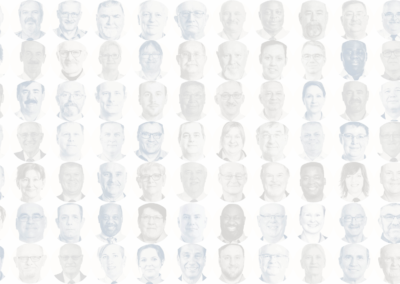Reflections on Indigenous research and engagement
ARTICLE
BY Sarah Roberton
One of the most rewarding parts of my career has been conducting opinion research in collaboration with Indigenous peoples. Looking back, I can clearly see how Environics’ approach to research involving Indigenous peoples has evolved as we learned to become better partners and allies. One critical learning has been that as non-Indigenous researchers, the quality of our work rests on our ability to engage with Indigenous organizations, researchers, communities and individuals to ensure that our process and research products truly respect Indigenous voices and that Indigenous peoples benefit from the outcomes.
The early studies we conducted for clients often focused on the problems facing Indigenous communities, such as health concerns and poor housing quality; often our clients were government agencies seeking to design or improve programs to address specific challenges. The Environics Institute’s Urban Aboriginal Peoples Study (UAPS) in 2009 marked an important turning point. The UAPS Steering Committee, a passionate and distinguished group of Indigenous and non-Indigenous advisors, steered the project far beyond “issues” to consider identity, experiences, values and aspirations – taking a holistic view. The project’s interviewers, mainly Indigenous students (building research capacity among early-career Indigenous people was one goal of the initiative), sometimes found themselves having interviews well beyond the allotted 60 minutes; many Indigenous participants said they had never been asked such meaningful questions by a researcher.
Yet at that time, outside of academia there was limited interest in high-quality, Indigenous-focused research. One organization that was early to recognize the value of using research to support their work was the Canadian Council for Aboriginal Business (CCAB). They have leveraged research to highlight the opportunities and challenges facing Indigenous entrepreneurs, and to successfully advocate for change in the way governments and corporate Canada engage with Indigenous businesses.
Now, almost two decades after those initial studies, it seems many organizations – Indigenous and non-Indigenous, across the public, private, and non-profit sectors – want to do research with Indigenous peoples. On the plus side, this intensified interest in many cases speaks to a genuine desire for engagement oriented toward reconciliation – an intention to engage Indigenous peoples more effectively by better understanding their priorities and perspectives.
The downside is that some researchers are not familiar with or discount the complicated relationship that Indigenous peoples and communities have with research, particularly when conducted by non-Indigenous researchers. Too often in public opinion and market research and stakeholder engagement, Indigenous peoples have been the subjects of the research but not the beneficiaries.
Many Indigenous people report having shared their time and knowledge with researchers over and over without seeing anything truly change based on the insights gathered through the research. So why, some ask, should they participate in more research?
Today, even as demand for input and insight from Indigenous peoples grows, fewer and fewer are willing to participate in surveys or discussions. (Participation rates are a challenge in the wider population as well, but among Indigenous peoples the reluctance to participate in research has a unique history).
The research tools that many non-Indigenous researchers rely on – quantitative surveys and qualitative focus groups – are grounded in European ways of learning and can themselves create barriers to participation. Culturally speaking, these tools are not always well-suited to Indigenous research. A memorable example: a First Nations researcher once told me about doing research with a First Nations community about improving the education system. In an interview, an Elder spoke at great length about water – about its value to the community and its children. That is, the Elder was drawing connections between the environment and the future of their community. I could imagine how difficult it would be for a non-Indigenous-led research team to know how to incorporate this information into the project as the researchers had framed it. Yet hearing and beginning to understand this kind of thinking is exactly what non-Indigenous organizations should be seeking.
How can researchers – especially non-Indigenous ones – respectfully engage Indigenous communities in research initiatives? First, it’s important to take the time to educate yourself and your organization. This should not be a box-ticking exercise, but a true investment and commitment. (If the project can’t accommodate an investment of time and reflection, it might not be the right project.) Explore existing research and reports related to your topic of interest. Can existing work answer your research questions? In many cases, non-Indigenous researchers ask questions that have been asked and answered before, while Indigenous respondents call for action based on the answers they have already given. If you determine that new primary research will indeed be valuable, make sure it expands on existing knowledge rather than simply repeating it. Make it a priority to seek out Indigenous researchers and consultants as partners. This will ensure Indigenous peoples have the opportunity not only to answer the questions, but to shape the questions and the methodology, resulting in culturally relevant research. Most importantly, make sure the research will have a benefit that Indigenous peoples themselves have indicated is meaningful to them. In addition to truly listening to the perspectives Indigenous peoples share, make sure that everyone connected to the project is committed to following through on what they learn.
If you have any questions about our Indigenous research, please don’t hesitate to reach out
Related insights



Toronto
366 Adelaide Street West
Suite 101, Toronto, ON
Canada M5V 1R9
416 920 9010
Ottawa
116 Albert St
Suite 300, Ottawa, ON
Canada K1P 5G3
613 230 5089
Calgary
421 7th Ave SW
Suite 3000, Calgary, AB
Canada T2P 4K9
403 613 5735
